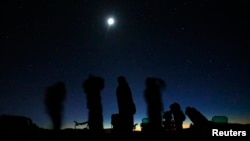NASA said on Thursday it has selected a research director to investigate UFO sightings on the recommendation of an independent panel of experts.
Administrator Bill Nelson, who made the announcement, has yet to identify the appointee.
The unidentified anomalous phenomena, or UAP, is the official term for what most call UFOs — unidentified flying objects. The panel, which included physicists, astronomers and biologists, wouldn't say whether eyewitness accounts of UAP prove the existence of life beyond our horizons.
That's still an open question, according to Nelson. "If you ask me do I believe there's life in a universe that's so vast that it's hard for me to comprehend how big it is, my personal answer is, 'Yes,'" he said.
In his statement, Nelson conceded that "[NASA scientists] don't know what these UAP are."
In 2021, the national intelligence director published a comprehensive report, sharing never-before-seen scientific data and military observations on coastal sightings of UAP. Some of the high-flying objects are said to outpace and outmaneuver even the best fighter jets, without any apparent thrust or flight control systems.
UAP have mystified Americans since June 1947, when newspapers first reported that a metallic "flying saucer" appeared in the sky over mountain ranges in Washington state. Sensational accounts of UAP sightings have cropped up all over the world since, including the debunked Roswell, New Mexico incident that made headlines that same year.
For the better part of a century, conspiracy theorists have accused the government of withholding facts or even lying to the public. But Nelson promised that NASA's incoming research director would disclose all UAP-related developments to "shift the conversation about UAP from sensationalism to science."
The director will manage "centralized communications, resources and data analytical capabilities to establish a robust database for the evaluation of future UAP," NASA said.
The appointment comes as academics claim to be making inroads in the search for extraterrestrial life. In recent weeks, the controversial Harvard astrophysicist Avi Loeb recovered tiny meteorite fragments off the coast of Papua New Guinea. His team is evaluating whether the unusual metallic samples are bits of alien technology.
Some information for this report was provided by Reuters.






